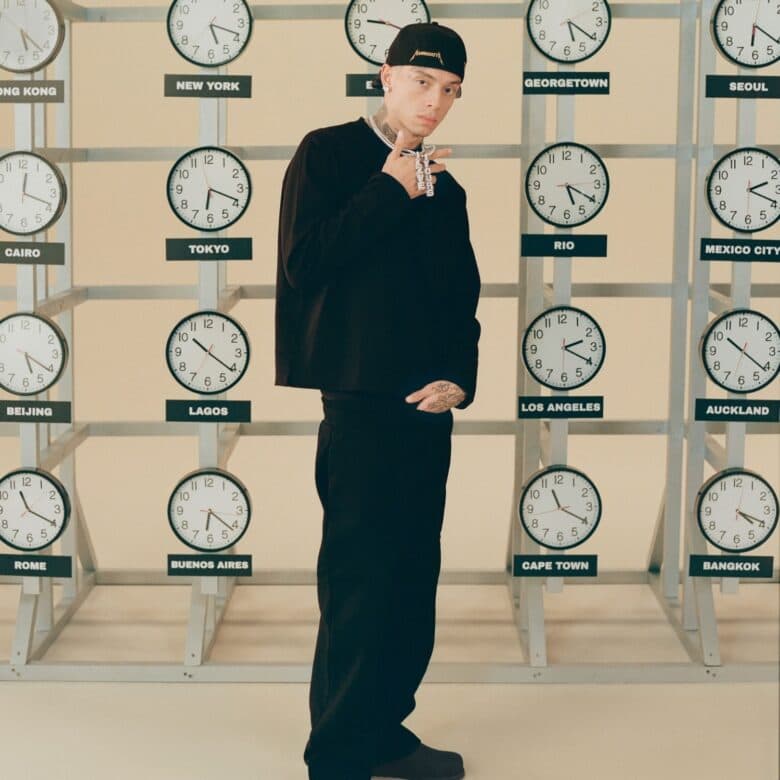Guy Pearce still cares

When my colleagues and I try to figure out what makes Guy Pearce so singular as an actor, we agree it’s down to that word that might make others in his line of work cringe — the “craft” of acting. For him, his vocation is all about delving into human psychology, as he tells me, and the 57-year-old hasn’t allowed his lengthy time in the industry to change that. My Zoom call with Pearce (who came to prominence in the same way a lot of Aussies did: the soap opera Neighbours) is nearly an hour long. When I attempt to wrap things up after a little nudge from his PR, he tells me not to worry: “I’m good for time.” For a man with what must be a demanding filming schedule (when we speak, he’s got sixty-three features under his belt) he’s exceedingly generous. With his words too — I come away from our chat not with a load of quotes I could find in other interviews, but an acute understanding of what makes him tick and what he makes of film today.
The actor might be in especially good spirits because he’s doing a promo for Brady Corbet’s The Brutalist. The film, as he puts it, has a “grandeur” to it. An epic post-Second World War drama starring Pearce alongside Adrien Brody, it was awarded the Silver Lion for best direction at the Venice Film Festival. It’s also got a hefty runtime, standing at just over three and a half hours. There’s even a 15-minute intermission. Pearce plays Van Buren, a “childlike man” who has “these agendas”. It’s a dark role, as is the case with many of his characters — “My eight-year-old can’t see any of the films I make” — and it feels like something of a pinnacle for the actor. He, of course, struggles to see that. When we talk about The Brutalist, Pearce pivots the conversation to the talent of Corbet and his wife, Mona Fastvold, who co-wrote the script. He’s also self-effacing about the huge part he played in the film’s brilliance. “I’m skilled enough to deliver something that I know will kind of work,” he tells me, “but I’m limited to my box of tricks.” That so-called box of tricks is an impressive one, though. While Pearce is emphatic about only being as good as his director, it’s by no stroke of luck that the Aussie has worked with everyone from Christopher Nolan (Memento) to Kathryn Bigelow (The Hurt Locker) to Ridley Scott (Prometheus). Pearce is quick to note that there’s also “a lot of shit” within his filmography, but the thread that ties it all together is how he approaches each and every one with the same conviction. There’s a seriousness to it — one that could, in the hands of someone who isn’t so easy and fun to talk to, veer into coming across as that little bit pretentious.


Though he’s “a little more relaxed than [he] used to be”, he admits that the emotional residue of each role still lingers. “If I have lots of tortured scenes in a movie, I’m wrecked after that job. I’m stripped, because you have to dig deep to find this stuff.” Recalling the times he has shot on location in faraway cities, he tells me he finds it hard to “go off and be a tourist” — “I’d rather just hover and be close-ish to the script.” And it’s what’s on the page that is of most importance to the actor. When roles have had that little bit less to work with — where he’s become “the creator of the story and the creator of a character”, as he puts it — he “never [does] a good job”. “I don’t trust myself,” he adds.
It makes sense, then, that Pearce couldn’t wait to “sink [his] teeth into” The Brutalist’s Van Buren. In fact, Corbet’s film seems to have come at the perfect time for the actor, who’s clearly equal parts excited about and disillusioned by the state of contemporary cinema. When
we touch on the film’s much talked about runtime, he raises the point that “people are happy to sit there and watch seven hours of their favourite TV show”. And when I suggest that commercial cinema has a kind of algorithmic quality these days, Pearce says that while there’s “nothing wrong with pure entertainment”, he has found this facet of the industry to be frustrating. “When I started doing a couple of commercial things in the States, executives were there on set going, ‘We just want to go on a fun ride.’ I was like, OK, you want to go on a fun ride… I want to actually delve into human psychology, but fair enough.”


Pearce is even surprisingly vehement when we explore the controversial subject of who has the right to play what role. It’s something that I cautiously bring up because of the film that gave Pearce his ostensible big break as a “serious” actor: Stephan Elliott’s The Adventures of Priscilla, Queen of the Desert, in which he plays a flamboyant drag queen. “I saw Cate Blanchett saying I’ll fight to the death to play people outside my socioeconomic world because I’m an actor,” he tells me. “I completely agree with her.” The Memento actor is also acutely aware that when it comes to these kinds of roles, it’s not so much a matter of politics as it is economics: “Studios will only pick these top ten actors to be in their movie because they get bums on seats. The casting problems aren’t about whether it’s a straight person playing that role — it’s about a famous person playing that role.”
It’s not a line of questioning I bring up brazenly with Pearce, who tells me that when it comes to the press, he’s got a “radar for bullshit”: “If I feel like someone’s being manipulative or if I can feel someone’s agenda, I’ll deflect and I’ll attack.” It’s a side of the actor that you get a whiff of in a 2018 profile by The Guardian, where Pearce is described as “skirting around the subject” when his role in Priscilla comes up. Six years on, it seems things have changed. Not only does the actor not “want to behave like that”, but he’s gained an awareness that there’s “nothing more exciting than meeting someone and going, ‘Hi, here’s me,’ and them going, ‘Hi, here’s me. You can trust me and I hope I can trust you too.’”


While Pearce wouldn’t agree that he’s open — “I’m very private” — I think he’d second me in saying he’s introspective. Introspection did at least play a significant role in his break from acting back in 2002. In previous interviews, Pearce has pegged that to doing so many back-to- back roles that he was about ready “to kill someone”. Come 2024, he frames it as a matter of becoming “a bit vacuous”. “Going from job to job to job […] I had a meltdown and just sort of went, ‘I gotta step away from all of this.’”
When Pearce returned to film, he came armed with the recognition that the breaks between projects were beneficial, allowing him to recharge. As someone who’s been acting since he was “a kid”, he also realised that he needed to make career choices “from the point of view of a 30-year-old rather than an eight-year-old” — still informed by that “childlike sense of expression” that keeps things from “becoming too heavy”, but no longer guided by scarcity. “When you start to work more regularly and if you’re lucky enough that people want to start using you more, you go, ‘Oh, I’ll make hay while the sun shines.’”


But one look at Pearce’s filmography doesn’t exactly paint a picture of an actor who’s been resting on his laurels. Those 60-plus films under his belt often take the form of four projects in the space of a year. And though he says he’s not actually too into cinema — “I haven’t been
in the movies in about eight years” — he’s clearly passionate about filling up that roster of his with a diverse set of directors. There are not only the Nolanesque auteurs — “To be in the hands of a director you really look up to […], that’s the be-all and end-all” — but the ostensible newbies who “come to you with this wonderful, open brilliance”.
And anchoring Pearce’s career, as ever, is Australian film. To name just a few, there’s David Michôd’s The Rover, John Hillcoat’s The Proposition (which was penned by none other than Nick Cave) and, most recently, Charles Williams’s prison drama Inside, which Pearce manages to sing the praises of repeatedly during our chat. When it comes to projects like these, it’s about more than Aussie pride for Pearce — it’s that these films possess a kind of grittiness that the inherent “gloss” of American studio films can’t quite handle. I suggest they’re a little like British films in that sense, and Pearce wholeheartedly agrees. “There’s a more raw way of approaching each other in the UK and Australia, which is refreshing to a lot of Americans. A little bit like, ‘Oh, you’re Australian. You said the C-word. OK. All right.’”

Whether he’s alluding to dirty expletives or acting out the time Jimmy Fallon made him laugh so much that his prosthetic lip fell off (a story that comes up when we discuss 2006’s Factory Girl, in which Pearce played the role of Andy Warhol and Fallon that of promoter Chuck Wein), my chat with Pearce is immensely fun. I’d even go so far as to call him a bit silly, and it feels like there’s something pertinent in all his mentions of the importance of being childlike. There’s also something remarkably prophetic about our whole exchange, actually. Days before we speak, I book a trip to Australia. I hesitate before mentioning it, but when I do he tells me to give his love to Melbourne. He even says that he hopes “we’ll see each other in person one day”.
- PhotographerJordan Rossi
- StylistOtter Hatchett
- WriterAmber Rawlings
- GroomerCarol Morley at Carol Hayes Management using CLARINS and DAIMON BARBER
- Photographer's AssistantSam Lort
- ProducerAbby Rothwell




